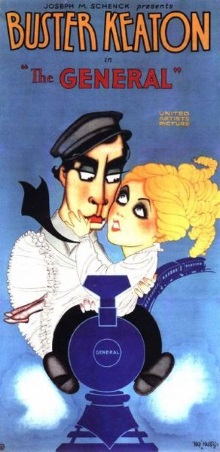
We’d previously watched Buster Keaton’s Sherlock, Jr. and ended up being surprised by how funny and creative it is. It stands to reason that we had pretty high expectations for The General. Keaton himself considered it his best film and is ranked among the greatest American films ever made. Unfortunately those expectations were largely dashed. It turns out that while Sherlock, Jr. is indisputably a comedy, The General isn’t. Instead, it’s an action-adventure film with some comedic elements and that makes all the difference.
Keaton himself stars as Johnnie Gray, a railway engineer based in Georgia during the outbreak of the American Civil War. Egged on by his lady love, he rushes to enlist as a soldier only to be turned away as he is obviously more valuable as an engineer. But when the fighting arrives in his town Johnnie finds an opportunity to be a hero anyway. A team of Union spies steals Johnnie’s beloved train and through the usual comedy of errors, he ends up being the only person who chases after the train to get it back, completely derailing the plans of the Union army and thus saving the day.
There are some laughs to be had here as well as the familiar moments when Keaton plays up being comically oblivious to the world. But since he is the hero here, he’s actually competent even if in a rather haphazard manner. The film doesn’t hide the fact that he really knows his stuff when it comes to trains. His antics here, such as when he needs to clear obstacles out of the path of his train or knock out enemies, remind me of the comedy of Jackie Chan. This means while it’s cool to see what is in effect the prototype of this type of physical comedy, Keaton’s performance here lacks the polish, showmanship and sheer physical ability that Chan has perfected.
Reading up on it, it seems that contemporary audiences were also disappointed that this film failed to deliver the expected laughs. Its glowing reputation was established only in later years and it’s easy to see why. The General is effectively the model of the action-adventure film that is today the standard staple of Hollywood. Barring a scene in the middle in which Keaton rescues the girl, the whole thing is basically one big chase scene, albeit one conducted using locomotives. There’s a rather impressive shot of an entire locomotive falling into the river which I understand is the single most expensive stunt of the silent era. It even has a large-scale battle scene between the Union and the Confederate forces.
As important as this film is to the history of cinema, it’s understandably underwhelming when set against the big spectacles of modern action movies. I still enjoyed myself but even I couldn’t help getting a bit bored. So I’ll chalk this up as one those films that is historically significant but not really worth going back to watch.